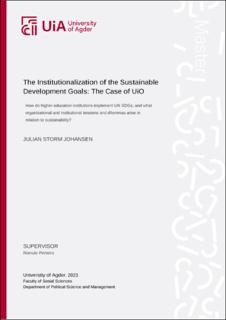| dc.description.abstract | The thesis investigates the implementation of the 17 UN sustainable development goals (SDGs) in higher education institutions (HEIs), more specifically University i Oslo (UiO). The study aims to uncover tensions and dilemmas linked to sustainability and the related SDGs. The research consists of an analytical framework, supplemented by organizational- and institutional theory as tools to help analyze data material. Semi-structured interviews of five employees at UiO have been conducted. The interview questions were based on pre-existing categories inherent in the analytical model, causing the analytical model to be a sufficient base of our research.
The findings indicate that the implementation of the SDGs cause several tensions and dilemmas. Relative to the analytical mode, the results suggest that practices, legitimacy, strategy, resources, and structure are explanatory factors for understanding the relationship between higher education and the sustainability agenda. The interview questions were based on pre-existing categories inherent in the analytical model, causing the analytical model to be a sufficient base of our research. The research explores how the implementation dynamics of SDGs causes resistance and acceptance to new reforms, and challenges existing structures and work processes. In addition, the study assumes that these individuals that inhabit the university constantly interpret, constrain and embrace the changes and challenges linked to sustainability.
The thesis concludes that the implementation of the SDGs at UiO are done strategically, through initiatives such as interdisciplinary collaboration, annual revisement plans, membership in university alliances, and internal interpretation of sustainability to contextualize the SDGs to a local level. Further, the study concludes that tensions and dilemmas are found in all parts of the organization, at the micro-, mezzo-, and macro-level. Lastly, the research concludes that a dualism of top-down and bottom-up processes are necessary for a meaningful implementation. | |
